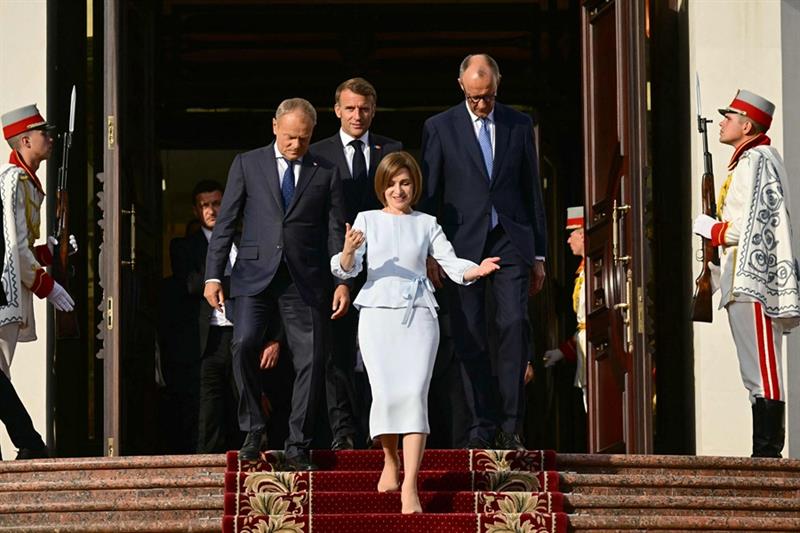France, Germany, and Poland Show Support for Moldova’s EU Path Before Vote

European leaders traveled to Moldova ahead of a critical election, amid concerns over possible Russian interference. The presidents and prime ministers of France, Germany, and Poland visited Moldova on Wednesday to commemorate the country’s 34th anniversary of independence from the Soviet Union, with parliamentary elections scheduled in a month that Moldovan President Maia Sandu fears could be targeted by Russia.
French President Emmanuel Macron, German Chancellor Friedrich Merz, and Polish Prime Minister Donald Tusk arrived in the capital of this EU candidate nation to hold discussions with Moldova’s pro-Western leader, Maia Sandu. They also participated in a public event celebrating Independence Day, which Moldova declared on August 27, 1991.
Macron stated in Chisinau that the purpose of the visit was to demonstrate that “Moldova matters and that its future lies with Europe and the European Union.”
This visit comes after Sandu recently warned of an “unprecedented interference” campaign by Russia aimed at disrupting the parliamentary elections scheduled for September 28. She described the threat as “a direct threat to our national security, sovereignty, and our country’s European future.” Russia has denied any involvement in meddling.
Sandu expressed on Wednesday, “Your presence here – France, Germany, Poland – shows not only your support for Moldova, but that the European project is alive, and that we are part of it. And let me say this clearly: There is no alternative to Europe. Without the European Union, Moldova will remain trapped in the past.”
She further added, “Today, our independence, our sovereignty, our peace are tested more than ever. These are immense pressures. But it is up to us whether they divide us or stop us on our path,”
referencing the multiple alleged attempts by Russia to destabilise Moldova.
Last year, the EU agreed to begin accession talks with Moldova following its official candidacy granted in 2022, the same day as neighboring Ukraine. Moldovans narrowly voted in favor of joining the EU, and Sandu secured a second presidential term during that election cycle, both marked by widespread accusations of Russian interference which Moscow denies.
Moldova’s strong pro-European stance has angered Moscow, with authorities accusing Russia of waging a “hybrid war” involving disinformation campaigns, vote-buying, and orchestrated protests intended to disrupt the country’s progress towards the EU.
Macron pledged France’s continued support throughout Moldova’s journey toward EU membership, a process expected to take several years.
“While a few hundred kilometres from your capital, Russia’s war of aggression against Ukraine continues to rage, it is also essential to remember that European integration is a clear choice from Moldova in favour of peace and justice,” Macron said. “Kremlin propaganda claims that Europeans are prolonging the war and that the European Union oppresses peoples. These are lies … the European Union is not the Soviet Union.”
Germany’s Chancellor Merz stressed Europe’s solidarity with Moldova, warning that “every day, Russia works tirelessly to disrupt and undermine freedom, prosperity, and peace” within the former Soviet republic.
“In the run-up to the upcoming parliamentary elections in this country, not a day goes by without massive hybrid attacks from Russia,” Merz remarked. “Moldova’s democracy is in the crosshairs, both online and offline. A free, open, liberal society is in the crosshairs.”
“That is why Germany is helping. And that is why Europe is helping. We are supporting Moldova in the fight against disinformation and in the fight against cyber campaigns,” he added. “We are helping by strengthening their security forces.”
Moldova’s ruling pro-Western Party of Action and Solidarity (PAS), in power since 2021, faces the risk of losing its parliamentary majority in the upcoming election, with no other clear pro-European parties on the ballot.
Cristian Cantir, a Moldovan associate professor of international relations at Oakland University, explained to The Associated Press that “most Moldovans understand that the visit is essentially a show of support for Moldova’s pro-European path.”
“There really is no other kind of viable pro-European or pro-Western party,” he noted, adding that if PAS fails to secure a majority, “things get very complicated because every other party is not as pro-European, and is much more committed to reconciliation or some sort of rapprochement with Russia.”
